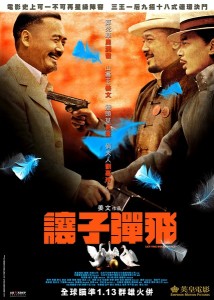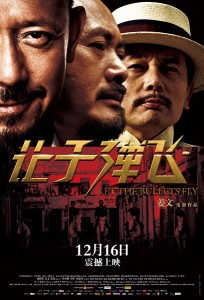Let the Bullets Fly
让子弹飞
China/Hong Kong, 2010, colour, 2.35:1, 132 mins.
Director: Jiang Wen 姜文.
Rating: 8/10.
A richly entertaining Oriental Western anchored by a well-honed, ironic script and terrific performances.
Goose Town, west Sichuan province, China, 1919. A train carrying new county governor Ma Bangde (Feng Xiaogang), his wife (Liu Jialing) and personal secretary-cum-professional swindler Tang (Ge You) is hijacked by bandit Zhang Muzhi, known as Scarface Zhang (Jiang Wen). Ma Bangde, who bought his own government posting, drowns when the train crashes in a river; Zhang Muzhi, who claims he just wants to make money, decides to pose as Ma Bangde and take up his posting in Goose Town, with Tang as his assistant and Ma Bangde’s wife transferring her allegiance to him. Arriving in Goose Town, Zhang Muzhi finds it a lawless place ruled by human trafficker-cum-raw opium dealer Huang Silang (Zhou Runfa), who is  so paranoid he even has an idiot body double to protect himself from assassination. Zhang Muzhi promises the people he will bring in the rule of law, but is sorely tested when his adoptive son, Lao Liu (Zhang Mo), commits suicide during a dispute with Huang Silang’s sidekick Hu Wan (Chen Kun). Zhang Muzhi and his men swear to avenge Lao Liu’s death. Huang Silang finally meets Zhang Muzhi face to face, feigning friendship and offering to help Zhang Muzhi make money by paying him 1.8 million to dispose of the bandit who’s been creating trouble for his business – none other than Scarface Zhang. An elaborate game of cat-and-mouse ensues between the two.
so paranoid he even has an idiot body double to protect himself from assassination. Zhang Muzhi promises the people he will bring in the rule of law, but is sorely tested when his adoptive son, Lao Liu (Zhang Mo), commits suicide during a dispute with Huang Silang’s sidekick Hu Wan (Chen Kun). Zhang Muzhi and his men swear to avenge Lao Liu’s death. Huang Silang finally meets Zhang Muzhi face to face, feigning friendship and offering to help Zhang Muzhi make money by paying him 1.8 million to dispose of the bandit who’s been creating trouble for his business – none other than Scarface Zhang. An elaborate game of cat-and-mouse ensues between the two.
REVIEW
Mainland actor-director Jiang Wen 姜文 finally gets the balance between content and showmanship pretty much right in his fourth feature, Let the Bullets Fly 让子弹飞. A partial tribute to the spaghetti westerns of Sergio Leone, wrapped in the now established clothing of an Oriental Western, Bullets lets fly with a mixture of widescreen action, dialogue rich in literary tropes and double-talk, and a well-structured script that reportedly went through more than 30 drafts before Jiang was satisfied – and shows it. An elaborate cat-and-mouse power struggle between a bandit pretending to be a county governor and a raw-opium dealer who rules a remote walled town, the film can be read in any number of ways by those looking for subtexts – another satire on New China’s rush for money? an allegory on the fruits of revenge? a parody of early 20th-century Chinese politics? – but is best enjoyed as an out-and-out audience movie with three veteran actors (Jiang, Ge You 葛优, Hong Kong’s Zhou Runfa 周润发 [Chow Yun-fat]) at the top of their game. If the result is a little over-long in its second half, and the plotting so labyrinthine only a computer could follow it, they’re small flaws in a film that always gives the sense it has one more interesting wrinkle up its sleeve to maintain interest.
Starting with a rip-roaring sequence involving a horse-drawn steam train that’s a direct reference to Leone’s Once Upon a Time in the West (1968), before settling down in the lawless Goose Town that seems modelled on the one in Fistful of Dollars (1964), into which a stranger rides to make money by playing off its rulers against each other, Bullets manages to keep the audience guessing about its characters’ true motives even while they’re trying to outwit and double-cross each other. Apart from providing a feast of acting, as Jiang, Ge and Zhou settle into their roles, the first hour comes up with one after another setpiece or idea that keeps the tone on a semi-fantastical level: an energetic welcome at the city gates by female drummers, a game of human football in the main street, or the bandit gang communicating with each other by bird-whistles.
Jiang’s style of filmmaking has always been larger-than-life, but here, unlike in the episodic The Sun Also Rises 太阳照常升起 (2007), or even in other recent Oriental Westerns like South Korea’s The Good The Bad The Weird 좋은 놈, 나쁜 놈, 이상한 놈 (2008) or China’s Wind Blast 西风烈 (2010), the setpieces and hearty performances are anchored to a script that’s foremost rooted in characters, not action. In fact, despite its title, the film is heavier on wordplay than gunplay; and after the final half-hour’s climax, Jiang has the confidence to go for a wistful coda that’s actually quite touching.
As the confident but basically lonely bandit, Jiang himself is very restrained here, content to share the screen with Ge (terrific as a smart-talking swindler who’d sell his mother for a bowl of rice) and Zhou (as in Curse of the Golden Flower 满城尽带黄金甲, 2006, and Shanghai, 2010, at his best when playing outsized bad guys). An early sequence, in which Zhou’s character hosts an evening at his home for the other two is one of the movie’s highlights – beautifully written and played, with double-meanings beneath every ironic, smiling exchange.
All three actors, however, are permanently surrounded by such a host of supports that Bullets is essentially an ensemble movie: the totally venal widow of Liu Jialing 刘嘉玲 [Carina Lau], the bearded ruffian of Jiang Wu 姜武, the turncoat sidekick of Chen Kun 陈坤, and even director Feng Xiaogang 冯小刚 and actor Hu Jun 胡军 popping up in cameos as a county governer and pock-faced imposter. Aside from Liu, the actresses don’t get much of a look-in in what is basically a male movie, though Jiang’s actress wife Zhou Yun 周韵 (The Sun Also Rises) and Miao Pu 苗圃 (Cherries 樱桃, 2007) have their moments as one of Zhou’s girls and as a woman from Ge’s past.
Design and costumes make some play with encroaching western habits, but only peripherally. In general, the mix of clothing (old-style imperial for Ge, western for Zhou, a mixture for Jiang) simply reflects the chaotic era in which the story is set – the so-called Warlord Period that followed the fall of the Qing dynasty and preceded the establishment of the more modern Nationalist (KMT) government. Throughout, the photography by Zhao Fei 赵非 (one of the three d.p.’s on Sun) ranges from warmly lit interiors to bright exteriors; music by Japan’s Joe Hisaishi 久石让 is jaunty but sparingly used.
The film was also released in a Sichuan dialect version which preserves the authentic flavour of the original by local author Ma Shitu 马识途 [the film is based on the chapter Tale of a Bandit Officlal 盗官记 in his 1983 collection 10 Amazing Stories 夜谭十记] and sites the movie in the region, compared with the Mandarin version which gives the whole film a northern flavour. All the actors voiced their own parts in the dialect version, apart from Liu and Zhou. Zhou’s voice was also dubbed in the Mandarin version. Locations used include Taishan and Kaiping in Guangdong province.
CREDITS
Presented by China Film Group (CN), Emperor Motion Pictures (HK), Beijing Buyilehu Film & Culture (CN). Produced by Beijing Buyilehu Film & Culture (CN).
Script: Zhu Sujin, Shu Ping, Jiang Wen, Guo Junli, Wei Xiao, Li Bukong. Novel: Ma Shitu. Photography: Zhao Fei. Editing: Cao Weijie. Music: Joe Hisaishi. Production design: Zhang Shuping [William Chang]. Art direction: Huang Jia’neng [Eddy Wong], Gao Yiguang, Yu Qinghua. Costume design: Zhang Shuping [William Chang], Lv Fengshan, Guo Biyin. Sound: Bo Wen. Action: Chun Wei, Xue Chunwei, Li Zhongzhi [Nicky Li].
Cast: Zhou Runfa [Chow Yun-fat] (Huang Silang; his body double), Jiang Wen (Zhang Muzhi/Scarface Zhang), Ge You (Tang), Liu Jialing [Carina Lau] (county governer’s wife), Feng Xiaogang (Ma Bangde, county governer), Ma Ke (Tang’s son), Chen Kun (Hu Wan), Zhou Yun (Hua/Flora), Liao Fan (Lao San/No. 3), Jiang Wu (Wu Zhichong), Miao Pu (Tang’s previous wife), Yao Lu (Hu Qian), Zhang Mo (Lao Liu/No. 6), Shao Bing (Lao Er/No. 2), Hu Jun (fake Scarface Zhang), Bai Bing (Daiyu Qingwenzi), Du Yiheng (Lao Si/No. 4), Hu Ming (Sun Shouyi), Wei Xiao (Lao Qi/No. 7), Li Jing (Lao Wu/No. 5), Zhao Ming (big-breasted woman), Yang Qiyu (Hu Bai).
Release: China, 16 Dec 2010; Hong Kong, 13 Jan 2011.
(Review originally published on Film Business Asia, 3 Jan 2011.)
